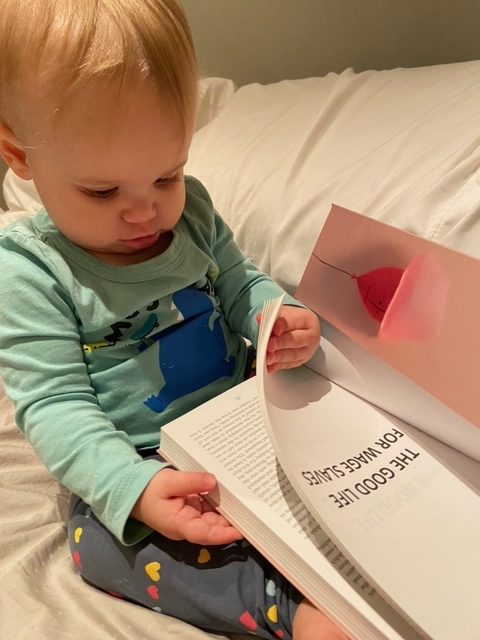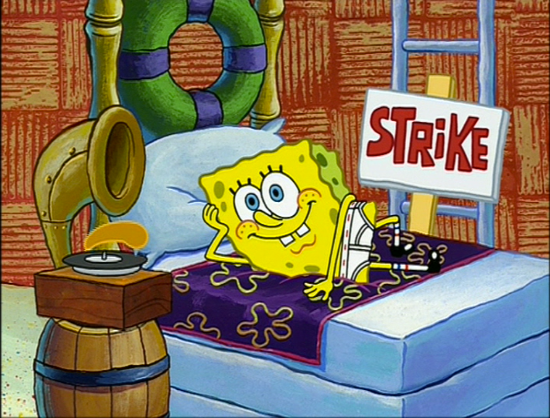The Art of the Rage Quit
I’ve been enjoying this thread on Twitter.
It’s a torrent of stories of workplace woe (from offices, kitchens, media outlets, grocery stores) and how the worker abruptly walked out one day, leaving a ball of fire in their wake.
There are some funny stories here but most of them just make your blood boil. It begins by marking the three-year anniversary of a positively scruptious “rage quit”:
3 years ago, I was late to work b/c a man set off a bomb in the subway. Most of my team hadn’t arrived when I got in, but my boss YELLED at me anyway. I let her finish, smiled, then told her I quit b/c I was starting a job at The New York Times. […] There is nothing unprofessional about making fun of managers who disrespect you or your work. Silence around abuse only allows it to propagate.*
That’s the way to do it!
Hundreds of other people have chimed in with their own rage quitting storiess. Here are some highlights:
I can top that one! 9/11 was on a Tuesday. My office was closed Wed, Thurs and Friday. We all came back Monday. On our next paycheck we were all docked pay for the missed days.*
Can you imagine? Docked for days not worked during 9/11!
I rage quit 3 years ago. I was laughed at in a meeting for asking for help & told that if I didn’t have things that were back filed put away I would be fired. Immediately walked to my desk, wrote a resignation, and told them I quit. Moved to a new city & started over the next week.*
My personal favourite:
A job colleague did a planned rage quit. She left a whole side of raw salmon in her locked desk drawer, crazy glued the lock, locked her office and crazy glued that lock. After a week they called the hazmat team. The office never really smelled ok after that.*
As much as I dislike going to work, I never had bosses as bad as those ones. There was the coffee shop manager, I suppose, who threatened to fire any team member who went home for Christmas (and thus be unavailable to work as usual on Christmas week) but I’d been planning to quit anyway so it didn’t exactly come to a rage quit. I enjoyed how this manager passive-aggressively failed to reply to my notice letter in any official or unofficial way though: I was just gone.
To counter the idea that bosses have to be awful (i.e. because being awful is a choice) here’s a nice one:
my best friend died a few years ago and my workplace gave me a week of bereavement leave. “But we weren’t related” I said. “You were friends for 22 years. Close enough. Go be with the family” said the boss. It’s possible not to be a jerk, bosses!!*
Our Friend, LD Beghtol: 1964-2020

Uncle LD twice wrote for New Escapologist and he sang at our final party. He was a force of nature.
His enthusiasm and spontaneity were something to behold. That he should fly all the way from New Jersey to Scotland to play at this event with our Reggie Chamberlain-King was entirely his idea. It was an important and beautiful, highly memorable, event. We’ll miss him and his ineffable presence. Thank you for the good times, LD.
https://www.youtube.com/watch?v=0JHrpwYQWpo&feature=emb_logo
Escapology Becomes a Vital Skill
As life on our beautiful rock grows louder, more disturbing, and more absurd, escapology becomes a vital skill.
So writes Jonathan Simons in a personable letter accompanying the latest Analog Sea Bulletin. It’s always good to see our parlance used in the wild.
The Bulletin is a willfully offline publication and you can send for a free copy by writing to Jonathan at one of his offices. I love the mischief of this.
The Bulletin is just 25 pages long but it’s beautifully presented and typeset, containing food for thought in the form of short writings by Virginia Woolf and Wim Wenders. It serves as a calling card for the main publication, Analog Sea Review, which is available by post or from an impressively large number of local stockists all over the world.
Bang Head Here
Reader Graeme writes by email:
I recently moved into a new office. It is the first time I’ve had the pleasure of having an office all to myself – thanks to Covid. The space was previously occupied by a revolving door of procurement and administrative staff. Many of their personal effects remain. The hard hat of a man fired three years ago still hangs on the wall. As I was staring off into space this morning at my desk I noted a faint message on the poorly maintained whiteboard. It read: “Bang Head Here.”
“Bang Head Here” is a classic of “defeated office worker” humour, isn’t it? It tells the story of executive know-nothings being impossible to satisfy and ever-expandable, constantly changing project briefs. Fuck it!
The specifics of the white board message aside, I love this sort of thing. “Left-behinds,” I call them, and there’s a sort of forlorn magic to them. I ache slightly when I see things like the sacked man’s hard hat: it’s a minor version of the eerie feeling one gets when looking at pictures of abandoned places. I can only imagine the magic of such items has intensified during the pandemic for people like Graeme who are currently working in deserted offices.
In every office I ever worked in, I became slightly preoccupied with staring at the tiny pieces of Christmas tinsel (or just blu-tack or push pins) in some corners of the ceiling. My name for this sub-genre of left-behind is “Ghosts of Christmas Past.” The story they tell is of the decorations being put up as a time-wasting exercise while the end-of-term spirit prevails and then being torn down quickly and unceremoniously upon the staff’s return to work.
Graeme’s message reminds me that white boards are actually a very good place to find left-behinds: the impressions of meetings of yesteryear. Meeting room white boards, in my experience, aren’t used very often so when the someone in a technical team draws a diagram of how a website or an arrangement of computer servers will work in theory, it’ll be there for us non-techies to wonder about for months while we try to survive our weekly team meetings or annual appraisals.
There were also the bits and pieces I wrote about in The Good Life for Wage Slaves (in a slice of memoir called “put the office in the bin” about a wonderful throwing-out session when we were forced to downsize our department). We found the left-behinds of a long-ago-retired colleague in the bottom drawer of a file cabinet. It was quite the archaeological adventure and it brought to mind the image of her fleeing on her last day. “Leave them, just go, go, go!” Here’s where to buy the book if the story appeals to you.
Back to Normal, Anyone?
When headlines began to declare last week that a vaccine was good to go and that the most vulnerable could start receiving it as early as the first week of December, my soul did a funny thing. It leapt. It did a little air punch and went “yeah!” but this celebratory motion of the spirit was quickly followed by a sense of, “oh.”
Maybe you experienced it yourself. It was like sensing that a long illness is over (“yeah!”) and that you can finally get out of bed and go back to work (“oh.”)
I know I won’t be the only one who experienced this. Ever since the pandemic began there have been environmentalists and anti-capitalists for example who, while lamenting the crisis, were able to see from their vantage points that “normal” had always been part of the problem. We should use the time afforded by the pandemic, they said, to regroup and come up with a better model for life.
Chief among our concerns about so-called normality are unnecessary commuting to work in cars and ram-packed trains, unnecessary economic activity full stop, and flying around in planes for frequent holidays and meetings. I often think of Mark Boyle who, in his book, goes back to the land and sees a plane overhead from his tiny Irish smallholding. He reflects on how alien it would be to him now to fly for an overseas holiday and he says something shruggish (I can’t find the exact quote) along the lines of “I guess that’s just what people do now.” It’s the implication that we’ve all just sleepwalked into what is actually a fairly remarkable and unsustainable “normal” of technologically miraculous but ecologically and socially irresponsible pursuits.
It’s wonderful that we can just take off and go to another country at the drop of a hat. Wonderful! But, historically (by which I mean by comparison to the past and the future) a bit odd. News that 1% of people are responsible for half of all flight emissions has made me feel less guilty about my love of mobility but I’d still like to fly less and for other people to fly less too.
The biggest event I had to cancel in March 2020 was a trip to Portugal. I was already jonesing for travel at that point, having not been anywhere for about a year. I haven’t been grounded for so long since that football went through the neighbour’s window in 1989. In practice, it hasn’t been so bad to go deep instead of wide but I’d still love to have width as an option again, which is probably how a lot of people feel about the return to work.
Still, going deep instead of wide has paid dividends for those willing and able to embrace it, and it would be a shame to completely give it all up.
A return to the old pace of life is being cautioned against, not just by passionate activists but by easygoing newspaper columnists. Here’s Nesrine Malik this morning on how the activities with which she has filled her pandemic time are threatened by the return to normality:
With the suspension of the mindless daily activity of normal life, an entire hinterland of dormant relationships emerged. But even as I tried to pick up these pieces my brain kept skipping forward. I found myself dreaming of the time when the everyday could restart again – even though, in all likelihood, that would mean these threads being buried once more.
In no longer having to travel for work, she says, she’s been able to put time into important correspondence, feeling out and maintaining important human connections. Should we really sacrifice this, along with everything else, for the return to normality?
That we have a vaccine and the end of the pandemic is in sight is undoubtedly a good thing. I just wish there had been more of an appetite for regrouping and questioning the nature of our return to normality. There has been a certain line of questioning, but I suspect that most people are going stir-crazy at home and just want to get back to flying around and driving and shopping and going to work like they used to.
I also suspect we will see busybodies of various official stripes, out in force, saying “back to work, you,” “back to work, you.” I predict a moralistic pressure that we all “do our bit” to get the floundering economy back on its feet despite the fact that working from home instead of the office has born no significant reduction in productivity.
Will we return to a “normal” rejigged to be less competitive, more sustainable, more spiritually-rewarding? Or will the extrovert ideal once again prevail though, by its nature, shouting the loudest? We shall see.
Be A Winner Like This Baby
Hey, look! Everyone’s reading The Good Life for Wage Slaves, even adorable babies.

You Got Me Livin’ Like a Slob

This is hilarious. Spongebob Squarepants once featured a short bluegrass song called “Hey, Mean Mr. Bossman.”
It’s a parody of Take this Job and Shove It, but more generally a piss-take of the sort of attitude we display here at New Escapologist. It’s great. It goes:
Hey, mean Mr. Bossman,
I’m a-quittin’ this here job.
You’ve been outside gettin’ tan
An’ I’ve been gettin’ robbed.
My life is worth so much more
Than a dollar an’ ten an hour,
Wakin’ up ’bout a quarter to four
An’ I’m startin’ to turn sour.
So, hey, mean Mr. Bossman,
I’m a-quittin’ this here job.
I’m sick of eatin’ oat bran
An’ livin’ like a slob.
You got me livin’ like a slob.
Mr Job
I stumbled today upon a seemingly rare bit of idealist anti-work music. It’s “Mr. Job” by The Alan Bown Set.
Just as cheerfully anti-work is The Good Life for Wage Slaves, still available here.
Luke Rhinehart (1932-2020)
“You lead a dull life, a life of slavery, a life that doesn’t satisfy you, but there’s a way to get out of it. This way is the dice. Let yourself go, submit yourself to it, and you’ll see, your life will change, you’ll become someone you can’t even imagine.”
So said Luke Rhinehart, the legendary Dice Man, who we lost on November 6th.
Luke (real name George) was a good friend to the magazine and a surprise character in my life. I’m grateful to him and I already miss him.
Rest in Chance, George.

Godspeed, Box!
We take advice from many literary sources here at New Escapologist. From children’s fantasy to DH Lawrence.
The words “barrel” and “scraping” might come to mind when I tell you this, but the lid of this knackered old shoebox has some good advice for life too.
I’m sure it’s only there as a point of corporate greenwashing, but you can’t knock the words when you take them at face value.

I decided to follow the “reuse” advice and use the shoebox to ship a stereo speaker I’d sold on eBay.
Something went wrong though and the customer returned it, so the box did double-duty by coming all the way back to me.
Even after all this, the box was not yet ready to disintegrate. So I used it to send five copies of my book to the legal deposit agency.
Here’s hoping they make it. Gulp. Godspeed, box!



